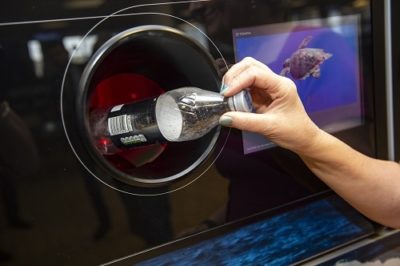The change of heart comes at the same time as Defra is grappling with the issue of glass from households and whether or not it can continue to be collected commingled from 2015.

On collection schemes, WRAP chief executive Liz Goodwin has conceded that while it was up to local authorities to decide what was best for them, the organisation no longer sees kerbside sorting as a preferable collection type.
And, the organisations chief executive has also confirmed that commingling can be the best option.
In a letter to a waste sector expert last month, and seen by letsrecycle.com, Dr Goodwin wrote: WRAP does not favour one type of collection scheme over another. I know that co-mingling is the best option in many circumstances and it is important that each local authority considers its local constraints and circumstances when deciding what route to go down.
Guidance
This view differs from current WRAP guidance which shows the organisation to be in favour of kerbside sort systems. The guidance states: WRAP has maintained for more than two years now that kerbside sort systems which allow contamination to be filtered out at the point of collection gives the most reliable stream of quality materials.
“Because of our priority for materials as a way to improve resource efficiency, WRAP believes that kerbside sort collections should be preferred where they are practical and should be in the majority of local authority areas.
Commenting on what appears to be a significant U-turn by WRAP, two industry insiders said it was a victory for common sense and that WRAP had now come to a view that contamination in commingling was not necessarily an issue.

‘I know that co-mingling is the best option in many circumstances and it is important that each local authority considers its local constraints and circumstances when deciding what route to go down.’
Dr Liz Goodwin, WRAP chief executive
Another waste industry source said that WRAPs stance may well have changed in part because of the Judicial Review earlier this year and Defras support for the option of commingling which was also backed by the Local Government Association.
In March this year, the case ruling was that commingled recycling collections could continue in England and Wales (see letsrecycle.com story).
Choice
[Updated 19/09/13] In a statement received yesterday, a WRAP spokesperson said: WRAPs view has always been that the choice of collection system should be a local decision taking into account local factors but also giving due consideration to wider national policy, objectives and priorities.
WRAP continues to believe that quality of recyclable materials is important which means consistently delivering materials to the market place that are effectively separated to meet customer requirements and comply with the UKs obligations under the revised Waste Framework Directive or with specific regulations in the Nations.
WRAPs role is to provide evidence and, on request, advice and support to help local authorities provide their residents with a quality waste and recycling service. The recycling service will need to be considered in the context of other collection and recycling services provided and as part of the overall service profile which may well include food and garden waste as well as refuse.
It should go without saying that any recycling service, irrespective of the containers used, or how materials are collected and sorted, should be reliable, well run and take account of the needs of the residents and where they live.
Glass
On glass, Defra is currently wrestling with the regulations which will cover materials recycling facilities and are due to be introduced in the autumn with six months transition time before they come into force.
The difficulty centres on whether glass sorted at materials recycling facilities can count as recycling if it is sent for aggregates usage. Under the terms of the revised Waste Framework Directive, the material will count as recycled if it is used for bottlemaking or other closed loop processes.
A large amount of MRF glass is currently sent for use in aggregates and waste management companies have differing views on what might happen in the future.
Veolia Environmental Services has indicated that it would be happy for glass to be collected separately if local authorities wished. Viridor, which runs the UKs largest MRF in Kent, also has its own glass recycling plants which can sort material for bottlemakers or glass fibre production.
Technology
Other views are that the technology to sort glass will improve by 2015 and that the introduction of a PRN specifically for glass which is sent for bottlemaking or for other reuse, such as glass fibre, will make the process of sorting glass more affordable. It could also help fund separate collections in some areas or the introduction of bottle banks if sites can be found.
Related Links
Last week, at the RWM exhibition, the Welsh Government’s head ofwaste strategy chief Andy Rees, discussed the issue of glass with thepanel at a seminar on recycling.
(UPDATED; SEPTEMBER 26) DrRees, raised the issue of glass with members of the panel discussing the MRF Code of Practice. Dr Rees made the point that glass might present a particular challenge for co-mingling collection systems as a result of the separate collection and high quality recycling requirement of the Waste Framework Directive.”








Subscribe for free